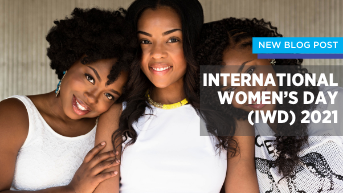International Women's Day 2021
International Women's Day (IWD) is celebrated annually on March 8 around the world, representing a focal point in the movement for women's rights as we celebrate their achievements without regard to division, whether national, ethnic, linguistic, cultural, economic or political. Since the early years, International Women's Day has assumed a new global dimension for women in developed and developing countries alike with its growing international women's movement, strengthened by four global United Nations women's conferences. This has allowed for tremendous support in making the commemoration a rallying point to build support for women's rights and participation in the political and economic arenas. The theme for the 2021 commemoration is Women in leadership: Achieving an equal future in a COVID-19 world.
The observance of IWD began in the early 1900s, a time of great expansion and turbulence in the industrialized world that saw booming population growth and the rise of radical ideologies. In or around 1908, great unrest and critical debate was occurring amongst women with oppression and inequality spurring them to become more vocal and active in campaigning for change. It was during this time that approximately 15,000 women marched through New York City demanding shorter hours, better pay and voting rights. By the following year in 1909 and in accordance with a declaration by the then Socialist Party of America, the first National Woman's Day (NWD) was observed across the United States on February 28 with women continuing this tradition to celebrate on the last Sunday of February until 1913.
Meanwhile in Europe, In 1910, at the second International Conference of Working Women being held in Copenhagen, Denmark Clara Zetkin (Leader of the 'Women's Office' for the Social Democratic Party in Germany) tabled the idea of establishing an International Women's Day. Her proposal was that every year in every country there should be a celebration on the same day, a Women's Day, to advance the agenda for women and ensure their issues were at the forefront. The conference of over 100 women from 17 countries, representing unions, socialist parties, working women's clubs, including three (3) pioneering female parliamentarians from Finland, greeted Zetkin's proposal with unanimous approval, paving the way for the 1st International Women's Day.
The decision in Copenhagen led to the first IWD commemoration 1911 in Austria, Denmark, Germany and Switzerland on March 19 with more than one million women and men attending IWD rallies campaigning for women's rights to work, vote, be trained, to hold public office and to end discrimination. Then, on the eve of World War I, between 1913 - 1914, while campaigning for peace, Russian women observed their first International Women's Day on February 23, the last Sunday in February on the Julian Calendar. Following discussions, it was then agreed that International Women's Day would be commemorated annually on March 8, to coincide with the translation of the Gregorian calendar which was widely used since 1582 but adopted officially by Russia for use in 1918. The translation meant February 23 on the soon-to-be-phased-out Julian Calendar, named for Julius Caesar would now coincide with March 8 on the newly-created Gregorian calendar, already widely accepted and in use, named for Pope Gregory XIII. It has since remained unchanged and continues to this day as the global date for International Women's Day ever since.
International Women's Day was celebrated for the first time by the United Nations in 1975 and then in December 1977, the General Assembly adopted a resolution proclaiming a United Nations Day for Women’s Rights and International Peace to be observed on any day of the year by Member States, in accordance with their historical and national traditions. By 1996, the UN announced their first annual theme "Celebrating the past, Planning for the Future" continuing to highlight various issues that affect women globally each year until the current. The dawn of the new millennium saw little activity occurring for International Women's Day in most countries as the world had moved on and, in many spheres, feminism wasn't a popular topic. There was however a need to re-ignite International Women's Day, ensuring it regained prominence as a global initiative that continued to raise awareness amongst the masses as there was still much more work to do in championing the cause of women globally.
The internationalwomensday.com platform was launched with the specific purpose of re-energizing the commemoration of IWD, focusing on celebrating and making visible the achievements of women while continuing the call for accelerating gender parity. The website, which provides useful guidance and resources, adopts an annual campaign theme that is globally relevant for groups and organizations. The 2021 campaign theme, #ChooseToChallenge, is one of many around the world and provides a framework and direction for annual IWD activity, taking into account the wider agenda of both celebration as well as the call to action for gender parity.
The world has witnessed a significant change and attitudinal shift in both women's and society's thoughts about women's equality and emancipation but ideas still vary as many from a younger generation may feel that 'all the battles have been won for women' while many feminists from the 1970's know only too well the longevity and ingrained complexity of patriarchy. With more women in the boardroom, greater equality in legislative rights, and an increased critical mass of women's visibility as impressive role models in every aspect of life, one could think that women have gained true equality. The unfortunate fact is that women are still not paid equally to that of their male counterparts, women still are not present in equal numbers in business or politics, and globally women's education, health and the violence against them is worse than that of men.
However, tremendous strides have been made as women continue to inspire the world as astronauts, presidents, prime ministers, and CEO’s, forging new paths as leaders in various fields of endeavour, including those once traditionally dominated by their male counterparts. Today, commemoration of International Women's Day ranges from being a public holiday in some countries to being largely ignored elsewhere. In some places, it is a day of protest whilst in others, it is a day that celebrates womanhood.
The 2021 UN theme for International Women's Day seeks to highlight the impact that girls and women worldwide have had as health care workers, caregivers, innovators and community organizers during the COVID-19 pandemic. The hashtag for this year will be #IWD2021 and #InternationalWomensDay. As we celebrate and inspire our women, let us remember that each of us can make a difference by thinking globally but acting locally in ensuring we all do our part to create a future for girls and women that is bright, equal, safe and rewarding. Let's make every day International Women's Day.
Written by:
Andre' W. Reid
Events/Communications Consultant
Andre Wayne Enterprise (A.W.E.)


